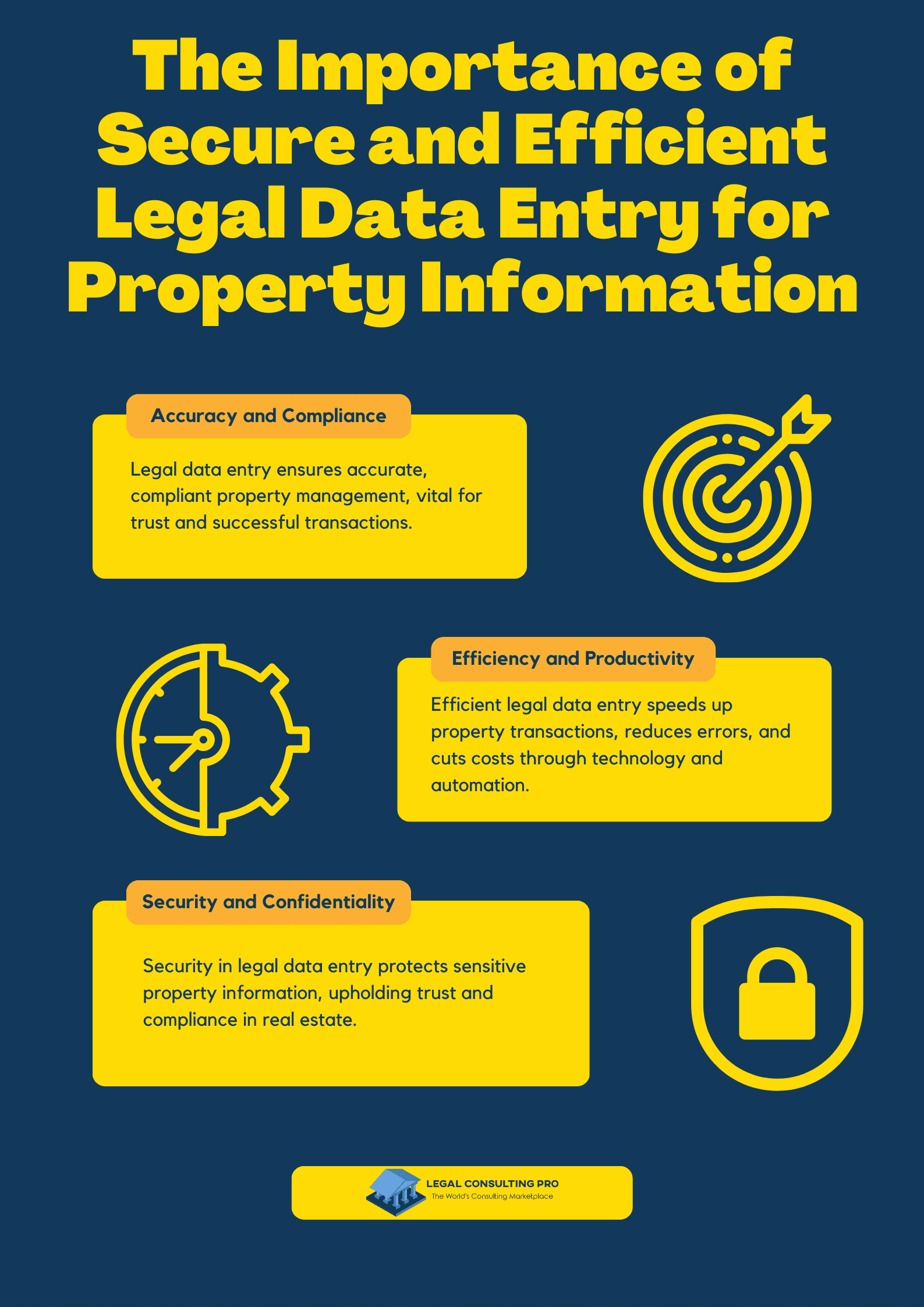In the realm of real estate and property law, success hinges not just on bricks and mortar but increasingly on data. With property transactions growing in complexity and information volume, the role of accurate, secure, and efficient legal data entry has become paramount. This article explores the critical importance of legal data entry in property information management and underscores the invaluable role of litigation support services in ensuring a seamless and compliant process. By understanding these key components, stakeholders can navigate the evolving landscape of property transactions with confidence, ensuring that they are well-equipped to meet the challenges and opportunities presented in today’s data-driven real estate environment.
The Evolution of Property Information Management
The real estate industry has undergone significant transformation over the years, with the digitization of property records and the adoption of technology in property management and transactions. As a result, property information management has evolved from traditional paper-based systems to sophisticated digital platforms that house vast amounts of data.
In this digital era, legal data entry has emerged as a critical component of property information management. It involves the meticulous inputting of property-related information into digital systems or databases, ensuring accuracy, completeness, and compliance with legal standards. This process encompasses a wide range of property-related documents, including deeds, titles, surveys, leases, and zoning documents.
The Importance of Secure and Efficient Legal Data Entry
Accuracy and Compliance
Legal data entry in property information management serves a crucial role in maintaining accuracy and adhering to legal standards and regulations. Ensuring precise and complete data is vital, as inaccuracies or omissions can result in legal disputes, financial setbacks, and tarnished reputations. For property owners, investors, and legal professionals engaged in property transactions, the integrity of data directly impacts decision-making processes and transaction outcomes. Therefore, meticulous legal data entry is essential to mitigate risks and uphold trust among stakeholders, safeguarding both financial investments and professional credibility.
Efficiency and Productivity
Efficiency in legal data entry for property information management is paramount to smooth operations and timely transactions. Traditional manual data entry methods often result in delays and errors, driving up operational costs and potentially hindering property deals. Adopting advanced technologies and automation tools can significantly streamline the data entry process. These tools not only reduce the time required for data input but also enhance accuracy by minimizing human errors. As a result, leveraging technology in legal data entry boosts productivity, expedites property transactions, and ultimately contributes to a more efficient and cost-effective property management process.
Security and Confidentiality
Security and confidentiality stand as crucial pillars in property information management due to the sensitive nature of property-related data. Legal data entry processes must rigorously comply with strict security protocols and data protection regulations to fend off unauthorized access, potential data breaches, and cyber threats. By implementing robust security measures and utilizing advanced encryption techniques, the risks associated with data exposure or compromise can be significantly reduced. Ensuring the integrity and confidentiality of property information not only protects the interests of property owners and investors but also upholds trust and compliance standards in the real estate industry.

The Role of Litigation Support Services
Document Management and E-Discovery
Litigation support services are instrumental in property information management, offering specialized expertise and resources tailored to handle property-related documents efficiently. These services excel in tasks such as document indexing, categorization, e-discovery, and data retrieval. By leveraging their expertise, they streamline the complex process of managing property documents, ensuring that all data is organized, accessible, and compliant with legal standards. Their role extends beyond mere data management; they act as strategic partners, helping property owners, investors, and legal professionals navigate the intricacies of property transactions with confidence and precision.
Data Analysis and Reporting
Beyond document management, litigation support services also provide valuable data analysis and reporting capabilities. These services leverage data analytics tools and techniques to offer insights into property trends, market conditions, and regulatory changes. By interpreting and presenting data effectively, they empower legal professionals to make informed decisions. Whether it’s assessing market trends to determine property values or staying updated on regulatory shifts affecting property transactions, the analytical prowess of litigation support services is indispensable. Their ability to transform complex data into actionable insights equips legal entities with the knowledge needed to develop effective property strategies and stay ahead in a competitive real estate landscape.
Compliance and Regulatory Support
Compliance with legal and regulatory standards is a multifaceted challenge in property information management. Litigation support services play a pivotal role in navigating this complexity by offering expert guidance and support. These services ensure that legal data entry processes align with relevant laws, regulations, and industry best practices. They conduct thorough audits, risk assessments, and compliance checks to identify any potential vulnerabilities or non-compliance issues. By proactively identifying these challenges, litigation support services enable property owners, investors, and legal professionals to implement timely corrective measures. This proactive approach not only mitigates risks but also fosters a culture of compliance, safeguarding the integrity of property transactions and enhancing trust among stakeholders.
Building a Foundation for Success
Building a robust foundation for success in property information management demands a comprehensive approach. This involves seamlessly integrating secure and efficient legal data entry practices with the support of comprehensive litigation support services. Prioritizing accuracy ensures that property data is reliable, while efficiency streamlines processes for smoother transactions. Security measures protect sensitive information, while compliance ensures adherence to legal standards and regulations. By harmonizing these elements, property owners, investors, and legal professionals can confidently navigate the intricate landscape of property transactions. With this integrated approach, they are well-equipped to achieve successful outcomes, mitigate risks, and foster trust among all stakeholders involved.
Conclusion
In conclusion, the modern real estate landscape is shaped by both bricks and data, reflecting the evolving nature of property transactions. As these transactions grow more complex and reliant on data, the role of secure and efficient legal data entry becomes paramount. By adopting advanced technologies and harnessing the expertise of litigation support services, stakeholders can ensure accuracy, streamline processes, and uphold compliance standards. Prioritizing these elements not only establishes a strong foundation for success but also paves the way for innovation and growth in the real estate industry. Embracing these practices enables stakeholders to navigate challenges effectively and seize new opportunities, driving the industry forward in the age of digital transformation.
Similar blogs:
Legal Data Entry: From Law School to Data Den: Reimagining Legal Education for the Age of Big Data
Legal Data Entry: Fast-Tracking Claims, Not Errors: How Precision Smooths the Claims Process













































